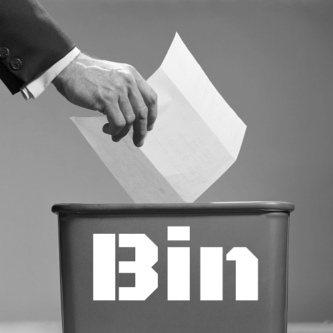
YouTube / iTunes / Spotify / Radio Public / Pocket Casts / Google Podcasts / Breaker / Overcast
Listen to ArtisanEnglish.jp posts & lesson intros here.
Word of the Day: File Thirteen
File Thirteen is a euphemism for a garbage can or trash can.
Now that I think of it, English has many different ways to refer to garbage receptacles around us.
We could refer to them as trash cans, rubbish bins, round files, circular files, dustbins, wastebaskets, wastepaper baskets, ashcans or, as we have today, file thirteen.
I did some digging on the internet, trying to find out where the term file thirteen originates.
I had initially surmised that it was because the number 13 is considered unlucky in Western culture.
Of course, the superstition surrounding the number 13 is an entirely different story.
It concerns a French king’s envy for the riches of the Templar Knights and his decision to have them all arrested or killed on Friday the 13th.
Anyways, to get back to the origin of file thirteen, yes, that superstition may be a factor.
If you handed in your resume to a business and they decided to toss it in the garbage, then you are truly unlucky.
Anyways, it’s thought to have originated with the US military in 1941.
Perhaps because there are 12 months in a year, and each month had a separate file.
If something was not going to be filed in either of those, it had to go somewhere, hence file thirteen.
Like many words, phrases and idioms in English, nobody knows the origin.
There is another theory that file thirteen originates from stencilling on a garbage can in the New Zealand military.
They call trash cans and bins, and a stencilled letter B looks like the number 13.

I guess we’ll never know for sure, but it is quite interesting.
Flesch-Kincaid Readability Test
This post is understandable by someone with at least an 8th-grade education (age 13– 14).
On the Flesch-Kincaid reading-ease test, this post scores 63.
The higher the score on a scale of 0 – 100, the easier the passage is to read.

